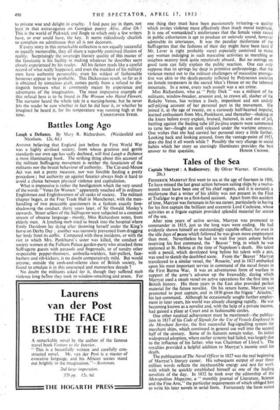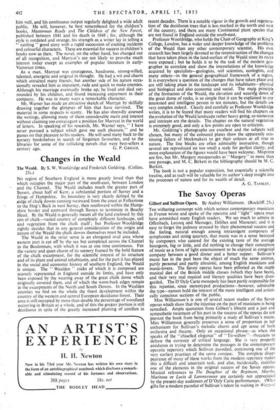Tales of the Sea
FREDERICK MARRYAT first went to sea at the age of fourteen in 1806. To have missed the last great action between sailing ships by a twelve- month must have been one of his chief regrets, and it is certainly a misfortune that a writer of his ability was not present in the Fleet at Trafalgar to give us a first-hand account. Apart from this accident of time, Marryat was fortunate in his sea career, particularly in having for his first captain the brilliant and eccentric Lord Cochrane, whose activities as a frigate captain provided splendid material for stories of the sea.
After nine- years of active service, Marryat was promoted to commander in 1815, just as the long wars were ending. He had evidently shown himself an outstandingly capable officer, for even in the idle days of peace which followed he was given more employment than most. Nevertheless he had to wait five years ashore before receiving his first command, the Beaver ' brig, in which he was stationed at St. Helena at the time of Napoleon's death. His talent with a pencil, which developed long before his talent with a pen, was used to sketch the deathbed scene. From the Beaver ' Marryat transferred to a similar vessel, the ' Rosario,' and in 1823 embarked upon his most important service in command of the naval forces in the First Burma War. It was an adventurous form of warfare in support of the army's advance up the Irrawaddy, during which Marryat used a steam vessel on active operations for the first time in British history. His three years in the East also provided perfect material for the future novelist. On his return home, Marryat was promoted to post captain, and in 1830 given the frigate Ariadne,' his last command., Although he occasionally sought further employ- ment in later years, his world was already changing rapidly. He was becoming known as a novelist and, with the help of a private income, had gained a place at Court and in fashionable circles. One other nautical achievement must be mentioned—the publica- tion in 1817 of his nide of Signals for the Use of Vessels Employed in the Merchant Service, the first successful flag-signalling system for merchant ships, which continued in general use well into the second half of the century. Some of its features remain today. Its initial widespread adoption, where earlier systems had failed, was largely due to the influence of his father, who was Chairman of Lloyd's. The royalties provided a helpful addition to Marryat's income until his death.
The publication of The Naval Officer in 1827 was the real beginning of Marryat's literary career. His subsequent output of over three million words reflects the inexhaustible energy and zest for work with which he quickly established himself as one of the leading novelists of the day. In 1832 he took over the editorship of the Metropolitan Magazine, a " monthly journal of Literature, Science and the Fine Arts, ' the particular requirements of which obliged him to write his later novels in serial form. Fortunately the form- suited him well, and his continuous output regularly delighted a wide adult public. He will, however, be best remembered for the children's books, Masterman Ready and The Children of the New Forest, published between 1841 and his death in 1848 ; for, although the style is outdated and strange, his strength as a writer lay in telling a " rattling " good story with a rapid succession of exciting incidents and colourful characters. These are essential for success children's books now as then. The novel, on the other hand, has changed out of all recognition, and Marryat's are not likely to provoke much interest today except as examples of popular literature in early- Victorian times.
As a man, Marryat was courageous, handsome, strong-willed, talented, energetic and original in thought. He had a wit and charm which attracted many friends, but another side of his nature occa- sionally revealed him as impatient, rude and quick to make enemies. Although his marriage eventually broke up; he lived and died sur- rounded by his children, and found increasing enjoyment in their company. He was in many ways a remarkable character.
Mr. Warner has made an attractive sketch of Marryat by skilfully drawing together the glimpses of him that have survived. The material in some respects is scanty. He has also shrewdly assessed the writings, allowing many of them considerable merit and interest without claiming too extravagant a position for Marryat in the world of letters. In speaking of his research, Mr. Warner says, " I have never pursued a subject which gave me such pleasure," and he passes on that pleasure to his readers. He will send many back to the nursery bookshelves in search of forgotten favourites, and to the libraries for some of the rollicking novels ,that were best-sellers a



































 Previous page
Previous page